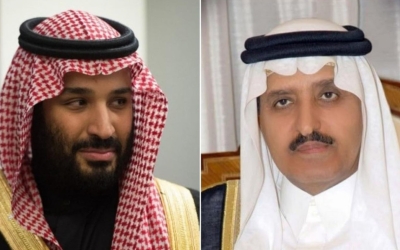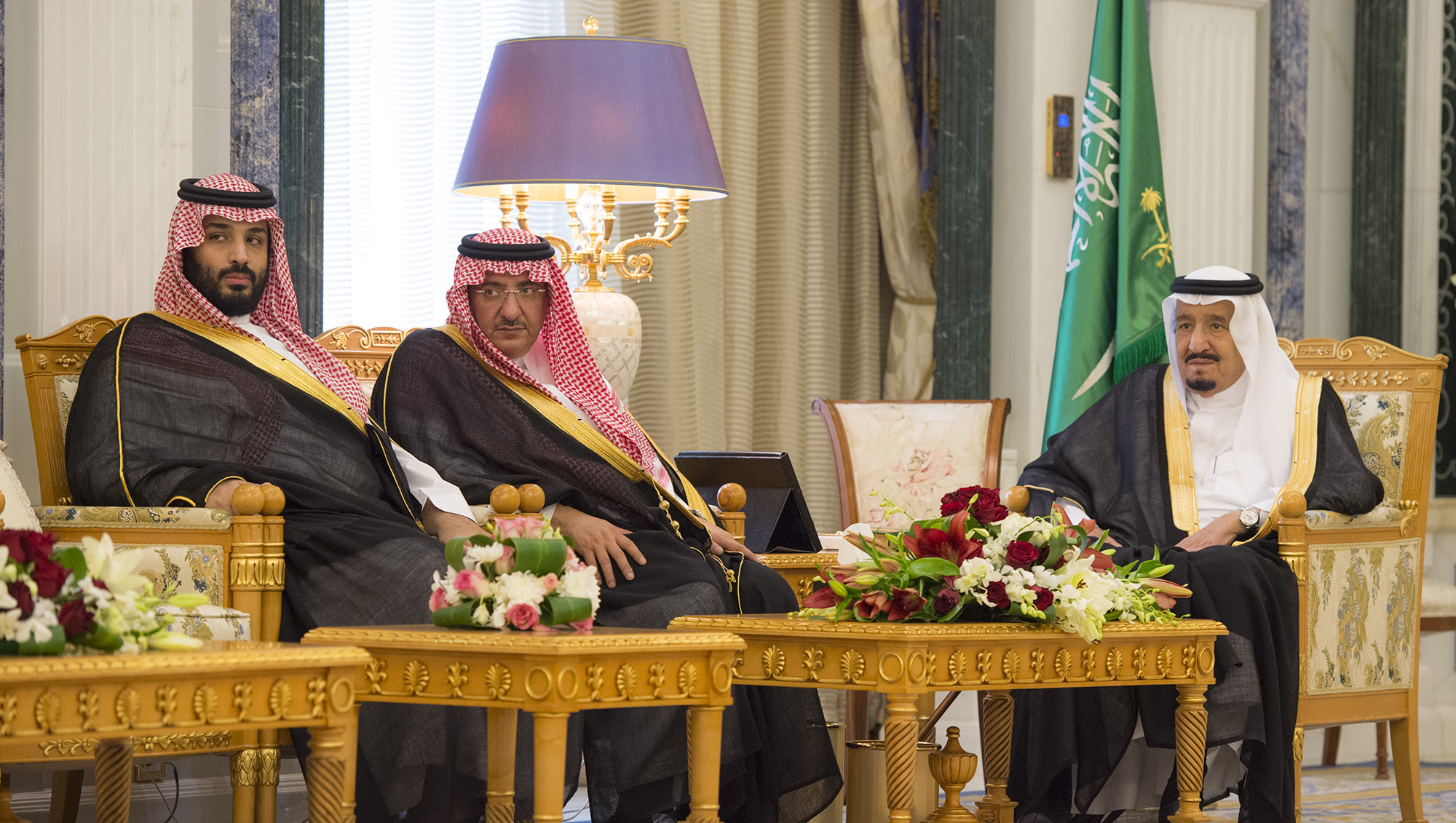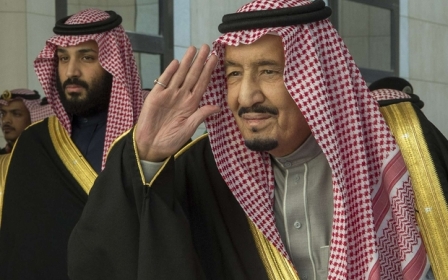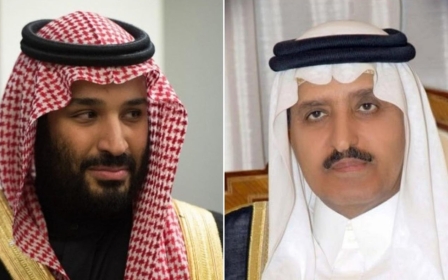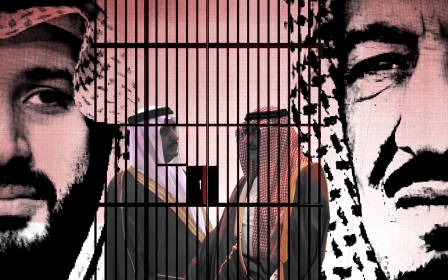EXCLUSIVE: Second member of key Saudi council arrested in MBS purge

A second member of the Bayaa, or Allegiance Council, which determines the succession to the Saudi throne, was arrested on Saturday as part of a purge of senior princes launched last week by Crown Prince Mohammed bin Salman, Middle East Eye has learned.
The arrested prince is Mohammed bin Saad Al Saud, the son of Saad bin Abdulaziz, the late brother of King Salman.
His apprehension followed that of Prince Ahmed bin Abdulaziz, the younger brother of King Salman, as well as his son Nayef bin Ahmed, and Mohammed bin Nayef, the former crown prince.
At least 20 princes in total have been arrested since Friday.
Well placed sources have also told MEE that Mansour al-Shalhoub, the director of Ahmed’s private office, is under arrest.
A third member of the Bayaa, Saud bin Nayef, the elder brother of Mohammed bin Nayef and the father of the interior minister, was taken in for questioning but later released. Saud is governor of the Eastern Province.
On Sunday, MEE revealed the crown prince’s plan to install himself as king while his father is still alive, and to do this by forcing Salman's abdication before Saudi Arabia hosts the G20 summit in November in Riyadh.
Such a move would require the endorsement of the Bayaa.
The pattern of arrests confirms what MEE has reported from sources aware of the crown prince’s plan: that the Bayaa, not an alleged coup plot, is the focus of the latest wave of arrests.
What is the Bayaa Council?
+ Show - HideThe Bayaa, or Allegiance Council, was created in 2007 by King Abdullah to secure the future succession to the Saudi throne. Previously this had been the sole prerogative of the king.
Its main purpose was to avoid a power struggle and ensure a smooth succession after all of the sons of Abdulaziz, the founder and first king of Saudi Arabia, had died.
The council is intended to ensure the collective loyalty to the monarch of all of the branches of the Saudi royal family. It was originally composed of 34 members, representing the number of sons of Abdulaziz who themselves had male offspring. When a member died or resigned they were replaced by their son, or a place was allotted to their branch of the family in the future.
The council has two principal roles: to determine if the king is capable of fulfilling his functions or to accept the king’s resignation; and to announce who the new crown prince will be following the accession of a new king, chosen nominally from three candidates offered by the king.
While the choice of crown prince is determined by a vote, in reality the council is expected to execute the new king's wishes.
However, a small but important clause in the council’s rules is that if the king is one of the founder’s grandsons, his crown prince cannot be from the same branch of the family (such as a brother or son).
This means that if Mohammed bin Salman becomes king, he would be expected to choose one of his cousins as crown prince.
The role of the Bayaa in Mohammed bin Salman’s scheme is two-fold.
The first would be to declare that King Salman, who has dementia, is no longer capable of carrying out his duties as king. The council could also - or additionally - lend its authority to a process in which the king abdicated voluntarily.
When it does so, the crown prince would become king.
As MEE reported when Prince Ahmed left his home in London with the assurances of M16 and the CIA that he would not be arrested on his return to Saudi Arabia, his aim was to block his nephew’s ascension to the throne constitutionally by using the powers vested in the Bayaa to do so.
The council’s second role is to approve a new crown prince, ostensibly from three candidates offered by the new king. Removing all the dissenting voices from it is thus key to Mohammed bin Salman’s plans to take the throne.
Worsening dementia
The current state of the king’s dementia is the subject of conflicting reports.
He stumbled over his speech at the EU-Arab League summit in Sharm el-Sheikh in February last year, and had to ask an aide whether he had read the first paragraph.
In a conversation with the Turkish President Recep Tayyip Erodogan in the aftermath of the murder of Jamal Khashoggi, the Saudi king was incapable of answering questions or engaging in a conversation. He merely repeated the words he was reading on a script.
However, a Kuwaiti delegation who saw him last year claimed that the king could speak freely with them.
MEE can reveal that the latest medical assessment of the king showed that his dementia had worsened.
One source familiar with his condition told MEE: “He is not fully aware of what is happening. He repeats the same sentences. He forgets what he said or what others said a few minutes earlier. He cannot focus.”
The other issue with King Salman is the extent to which he is free to operate independently of his son, who controls his bodyguards and acts as the gatekeeper to his father, even excluding one friend with whom the king liked to play cards, according to another source with knowledge of the inner workings of the royal court.
The arrests of Prince Ahmed and Mohammed bin Saad, in addition to the questioning of Saud bin Nayef and previous arrest of Prince Miteb bin Abdullah, mean that a total of four members of the Bayaa have now been arrested or cautioned.
The membership of the Bayaa was formed to represent different branches of the sons of Abdulaziz. As a result of this move, the Bayaa is completely under the control of Mohammed bin Salman and his satellites.
The arrests have been accompanied in the last few days by a renewed wave of social media propaganda by pro-government trolls accusing Mohammed bin Nayef of being a drug taker, a traitor and an ally of Erdogan.
MEE asked the Saudi embassy in London for comment but it had not responded at the time of publication.
This article is available in French on Middle East Eye French edition.
Middle East Eye delivers independent and unrivalled coverage and analysis of the Middle East, North Africa and beyond. To learn more about republishing this content and the associated fees, please fill out this form. More about MEE can be found here.


